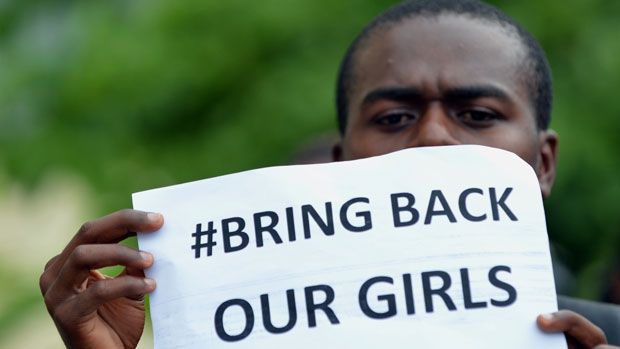Nigeria kidnappings: will Boko Haram release schoolgirls?
Deal to free more than 200 schoolgirls kidnapped in April is in doubt after latest abductions and attacks

A free daily email with the biggest news stories of the day – and the best features from TheWeek.com
You are now subscribed
Your newsletter sign-up was successful
Boko Haram militants are believed to have abducted at least 30 children from a village in north-east Nigeria, despite an alleged truce with the country's military.
The latest abduction comes as the Nigerian press reports that more than 200 kidnapped schoolgirls are expected to be handed over by the Islamist organisation today.
Human Rights Watch (HRW) estimates that the militants have captured more than 500 women and girls since it began its violent insurgency in 2009. The largest single abduction occurred when the 276 schoolgirls were taken from Chibok in April.
The Week
Escape your echo chamber. Get the facts behind the news, plus analysis from multiple perspectives.

Sign up for The Week's Free Newsletters
From our morning news briefing to a weekly Good News Newsletter, get the best of The Week delivered directly to your inbox.
From our morning news briefing to a weekly Good News Newsletter, get the best of The Week delivered directly to your inbox.
Earlier this month, the head of the Nigerian armed forces announced that a truce has been reached with the Islamist militant group and that they had agreed to release the Chibok girls. The announcement was greeted with widespread scepticism in Nigeria, with most commentators doubting that the girls will ever be released.
Some even suggested that the announcement was merely an election ploy by President Goodluck Jonathan. "It's interesting the timing comes as Jonathan is about to announce he wants to run for a second term. Is it by sheer coincidence?" the spokesman for the main All Progressives Congress, Lai Mohammed told Reuters.
Boko Haram have yet to comment on the deal, but so far it has "let its weapons do the talking" as another 60 women and girls were kidnapped the week after the deal was struck, according to CCN. Since then, dozens of attacks have taken place across northern Nigeria.
However, the government says Boko Haram may not be behind the recent attacks, instead it has blamed other criminal groups which are "exploiting the chaos of its insurgency".
A free daily email with the biggest news stories of the day – and the best features from TheWeek.com
Officials in Chad who mediated the deal to free the Chibok girls insist they will be released, despite a breakdown in the truce, according to Reuters. Oby Ezekwesil, organiser of the "Bring back our girls" campaign told Reuters she remained "cautiously optimistic" that girls would be released but also "extremely anxious" about their fate. "If it happens, it would be the best news in decades," she said.
But, even if a deal has been struck with a spokesperson from Boko Haram, it is unlikely he would have been able to speak for the entire organisation. "Boko Haram is deeply fractured. The Nigerian government has had a... difficult time identifying a Boko Haram representative who could make compromises and guarantee the entire group will observe them," according to the global intelligence company Stratfor.
-
 The mystery of flight MH370
The mystery of flight MH370The Explainer In 2014, the passenger plane vanished without trace. Twelve years on, a new operation is under way to find the wreckage of the doomed airliner
-
 5 royally funny cartoons about the former prince Andrew’s arrest
5 royally funny cartoons about the former prince Andrew’s arrestCartoons Artists take on falling from grace, kingly manners, and more
-
 The identical twins derailing a French murder trial
The identical twins derailing a French murder trialUnder The Radar Police are unable to tell which suspect’s DNA is on the weapon
-
 Epstein files topple law CEO, roil UK government
Epstein files topple law CEO, roil UK governmentSpeed Read Peter Mandelson, Britain’s former ambassador to the US, is caught up in the scandal
-
 Iran and US prepare to meet after skirmishes
Iran and US prepare to meet after skirmishesSpeed Read The incident comes amid heightened tensions in the Middle East
-
 Israel retrieves final hostage’s body from Gaza
Israel retrieves final hostage’s body from GazaSpeed Read The 24-year-old police officer was killed during the initial Hamas attack
-
 China’s Xi targets top general in growing purge
China’s Xi targets top general in growing purgeSpeed Read Zhang Youxia is being investigated over ‘grave violations’ of the law
-
 Panama and Canada are negotiating over a crucial copper mine
Panama and Canada are negotiating over a crucial copper mineIn the Spotlight Panama is set to make a final decision on the mine this summer
-
 Why Greenland’s natural resources are nearly impossible to mine
Why Greenland’s natural resources are nearly impossible to mineThe Explainer The country’s natural landscape makes the task extremely difficult
-
 Iran cuts internet as protests escalate
Iran cuts internet as protests escalateSpeed Reada Government buildings across the country have been set on fire
-
 US nabs ‘shadow’ tanker claimed by Russia
US nabs ‘shadow’ tanker claimed by RussiaSpeed Read The ship was one of two vessels seized by the US military